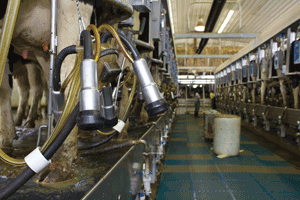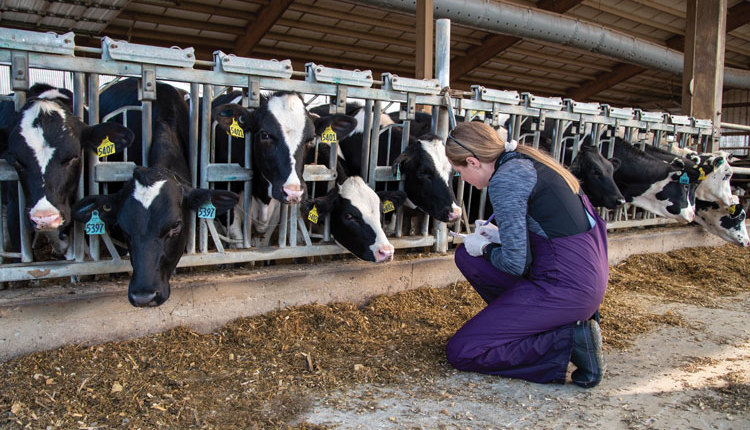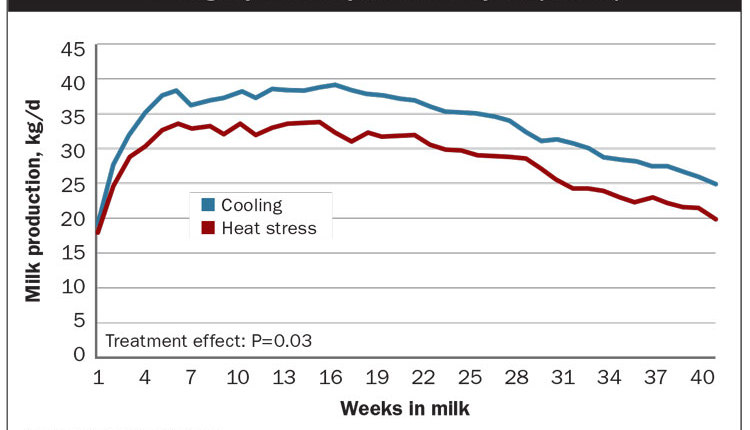The author is at the University of Minnesota College of Veterinary Medicine.
This article is part of a series prepared in cooperation with the American Association of Bovine Practitioners.
 Consumers of dairy products expect and deserve the ability to purchase safe and wholesome products, and this is exactly what the dairy industry strives to provide to them every day. Ensuring that our dairy products are free of antibiotic and other drug residues begins at the farm by using the medications available to your operation wisely.
Consumers of dairy products expect and deserve the ability to purchase safe and wholesome products, and this is exactly what the dairy industry strives to provide to them every day. Ensuring that our dairy products are free of antibiotic and other drug residues begins at the farm by using the medications available to your operation wisely.
There are a number of safe and effective medications that have been approved by the Food and Drug Administration for use in lactating dairy cattle. When used properly, these medications can have a positive impact on the health and well-being of the cattle in our herds. When used improperly, these same medications may not only be ineffective and costly, but their improper use also could lead to a drug residue violation.
After your milk leaves the farm but before it enters into the processing system, it will be tested for drug residues. This testing is required under the rules of the Pasteurized Milk Ordinance (PMO). The tests have been proven to be accurate and reliable.
People often will refer to antibiotic residues when discussing drug residue testing. Antibiotics are a specific type of drug, but other medications (such as anti-inflammatory medications or dewormers) also are types of drugs. Currently, the PMO only has routine testing requirements for antibiotics, but regulators are taking a close look at all drug use to determine if the PMO requirements need to be modified.
The PMO also requires that, if testing a bulk milk tanker reveals milk positive for drug residues, the milk shall be disposed of in a manner that removes it from the human or animal food chain. In addition, the state regulatory agencies will determine the producer (or producers) responsible for the residue violation.
The most important thing for you as a producer to do is to develop an open and collaborative relationship with your herd veterinarian. This is known as establishing a valid Veterinarian-Client-Patient Relationship (VCPR). With a valid VCPR, your veterinarian can assist you in determining how to use medications properly so that they are the most effective and also how to properly use medications so that the risk of a drug residue violation is minimized.
When the FDA approves a drug for use in a food animal species, it will provide a set of label directions that provide very specific details on the proper use of the drug. This includes the conditions that the drug is known to be effective for, the dose, the route of administration, the frequency and duration of treatments. In addition, there will be specific milk and meat withdrawal periods that need to be followed. Once a drug has been eliminated from the system of an animal, it is safe to ship her milk or meat as food. Using drugs on your dairy according to approved label directions is an important way to guard against a residue violation.
Previous articles in this series on using medications wisely have described a special category of drug use known as "extra-label use." You should review the way that all drugs are used on your dairy. Make a specific point to consult with your veterinarian if you have any questions about possible extra-label use. A VCPR is required for legal use of any prescription or extra-label drug use.
In addition, there are very special considerations for drug residue prevention when extra-label drug use is determined to be necessary. The extra-label use of the drug means that the milk and meat withdrawals that were established during the drug approval process may no longer apply and that you very likely will need to extend the withholding times.
The Food Animal Residue Avoidance and Depletion Program (FARAD) is a National Food Safety Project administered through the USDA that is an invaluable resource for everyone involved in the production of food products. The FARAD system is able to provide you and your veterinarian with scientifically based information on how to avoid drug residues, including when extra-label use has been determined to be necessary by your veterinarian.
On-farm testing for drug residues also is an option. The Milk and Dairy Beef Residue Prevention Protocol Producer Manual of Best Management Practices is published every year by the Dairy Quality Assurance Center (DQA) and the National Milk Producers Federation. This manual is an excellent up-to-date resource for the most common milk, serum, and urine residue screening tests that are available to dairy producers. Discuss with your herd veterinarian whether or not on-farm residue testing is appropriate for your operation.
It is important to use a test that will detect the type of antibiotics that are being used on your farm. The use of on-farm residue testing is only one small part of having a complete drug residue prevention plan in place.
Avoiding violative milk or meat residues depends on these key practices. Use FDA approved medications. Follow label directions when possible. Extra-label drug use must have withdrawal times appropriate for the dose, medication, and route of administration. Do not exceed dose per injection site recommendations. Screen cattle which may not have cleared the antibiotics normally.
Suppliers of residue test kits
Here are companies marketing drug residue detection tests, according to the 2009 Milk and Dairy Beef Quality Assurance Program from National Milk Producers Federation.
Charm Science, Inc.
659 Andover St.
Lawrence, MA 01843
Phone: 800-343-2170
www.charm.com
DSM Food Specialties USA, Inc.
45 Waterview Blvd.
Parsippany, NJ 07054
Phone: 800-662-4478
www.dsm-foodspecialties.com
IDEXX Laboratories, Inc.
One IDEXX Drive
Westbrook, ME 04092
Phone: 800-321-0207
www.idexx.com
Silver Lake Research Corporation
911 S. Primose Ave. Ste. N
Monrovia, CA 91016
Phone: 888-438-1942
www.silverlakeresearch.com
Strategic Diagnostics, Inc.
111 Pencader Drive
Newark, DE 19702
Phone: 800-544-8881
www.sdix.com
Click here to return to the Animal Care E-Sources
101025_689
This article is part of a series prepared in cooperation with the American Association of Bovine Practitioners.
 Consumers of dairy products expect and deserve the ability to purchase safe and wholesome products, and this is exactly what the dairy industry strives to provide to them every day. Ensuring that our dairy products are free of antibiotic and other drug residues begins at the farm by using the medications available to your operation wisely.
Consumers of dairy products expect and deserve the ability to purchase safe and wholesome products, and this is exactly what the dairy industry strives to provide to them every day. Ensuring that our dairy products are free of antibiotic and other drug residues begins at the farm by using the medications available to your operation wisely.There are a number of safe and effective medications that have been approved by the Food and Drug Administration for use in lactating dairy cattle. When used properly, these medications can have a positive impact on the health and well-being of the cattle in our herds. When used improperly, these same medications may not only be ineffective and costly, but their improper use also could lead to a drug residue violation.
After your milk leaves the farm but before it enters into the processing system, it will be tested for drug residues. This testing is required under the rules of the Pasteurized Milk Ordinance (PMO). The tests have been proven to be accurate and reliable.
People often will refer to antibiotic residues when discussing drug residue testing. Antibiotics are a specific type of drug, but other medications (such as anti-inflammatory medications or dewormers) also are types of drugs. Currently, the PMO only has routine testing requirements for antibiotics, but regulators are taking a close look at all drug use to determine if the PMO requirements need to be modified.
The PMO also requires that, if testing a bulk milk tanker reveals milk positive for drug residues, the milk shall be disposed of in a manner that removes it from the human or animal food chain. In addition, the state regulatory agencies will determine the producer (or producers) responsible for the residue violation.
The most important thing for you as a producer to do is to develop an open and collaborative relationship with your herd veterinarian. This is known as establishing a valid Veterinarian-Client-Patient Relationship (VCPR). With a valid VCPR, your veterinarian can assist you in determining how to use medications properly so that they are the most effective and also how to properly use medications so that the risk of a drug residue violation is minimized.
When the FDA approves a drug for use in a food animal species, it will provide a set of label directions that provide very specific details on the proper use of the drug. This includes the conditions that the drug is known to be effective for, the dose, the route of administration, the frequency and duration of treatments. In addition, there will be specific milk and meat withdrawal periods that need to be followed. Once a drug has been eliminated from the system of an animal, it is safe to ship her milk or meat as food. Using drugs on your dairy according to approved label directions is an important way to guard against a residue violation.
Previous articles in this series on using medications wisely have described a special category of drug use known as "extra-label use." You should review the way that all drugs are used on your dairy. Make a specific point to consult with your veterinarian if you have any questions about possible extra-label use. A VCPR is required for legal use of any prescription or extra-label drug use.
In addition, there are very special considerations for drug residue prevention when extra-label drug use is determined to be necessary. The extra-label use of the drug means that the milk and meat withdrawals that were established during the drug approval process may no longer apply and that you very likely will need to extend the withholding times.
The Food Animal Residue Avoidance and Depletion Program (FARAD) is a National Food Safety Project administered through the USDA that is an invaluable resource for everyone involved in the production of food products. The FARAD system is able to provide you and your veterinarian with scientifically based information on how to avoid drug residues, including when extra-label use has been determined to be necessary by your veterinarian.
On-farm testing for drug residues also is an option. The Milk and Dairy Beef Residue Prevention Protocol Producer Manual of Best Management Practices is published every year by the Dairy Quality Assurance Center (DQA) and the National Milk Producers Federation. This manual is an excellent up-to-date resource for the most common milk, serum, and urine residue screening tests that are available to dairy producers. Discuss with your herd veterinarian whether or not on-farm residue testing is appropriate for your operation.
It is important to use a test that will detect the type of antibiotics that are being used on your farm. The use of on-farm residue testing is only one small part of having a complete drug residue prevention plan in place.
Avoiding violative milk or meat residues depends on these key practices. Use FDA approved medications. Follow label directions when possible. Extra-label drug use must have withdrawal times appropriate for the dose, medication, and route of administration. Do not exceed dose per injection site recommendations. Screen cattle which may not have cleared the antibiotics normally.
Suppliers of residue test kits
Here are companies marketing drug residue detection tests, according to the 2009 Milk and Dairy Beef Quality Assurance Program from National Milk Producers Federation.
Charm Science, Inc.
659 Andover St.
Lawrence, MA 01843
Phone: 800-343-2170
www.charm.com
DSM Food Specialties USA, Inc.
45 Waterview Blvd.
Parsippany, NJ 07054
Phone: 800-662-4478
www.dsm-foodspecialties.com
IDEXX Laboratories, Inc.
One IDEXX Drive
Westbrook, ME 04092
Phone: 800-321-0207
www.idexx.com
Silver Lake Research Corporation
911 S. Primose Ave. Ste. N
Monrovia, CA 91016
Phone: 888-438-1942
www.silverlakeresearch.com
Strategic Diagnostics, Inc.
111 Pencader Drive
Newark, DE 19702
Phone: 800-544-8881
www.sdix.com
101025_689








